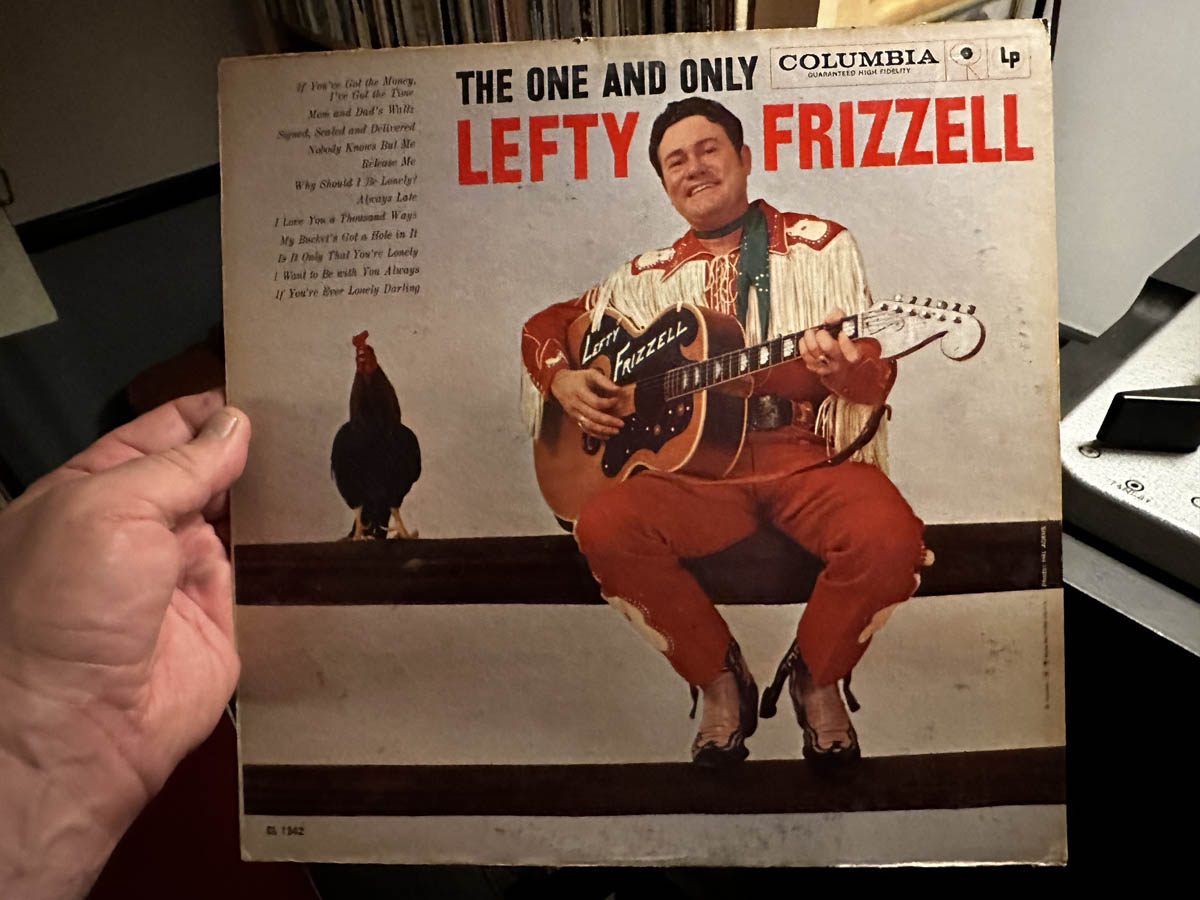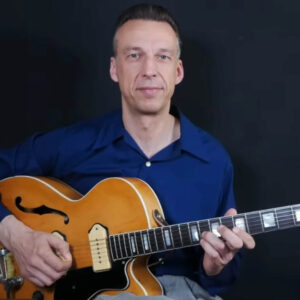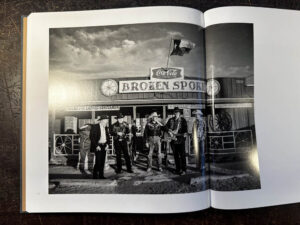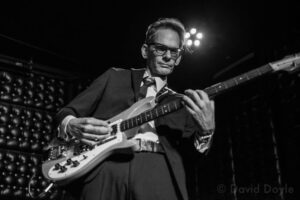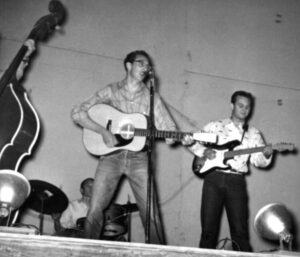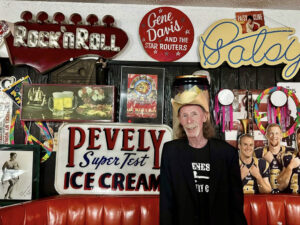Had a listen tonight to Lefty Frizzell’s The One and Only Lefty Frizzell. If you’re a country music fan, and a Lefty Frizzell fan, this album is an enjoyable listen but a real mixed bag. It was an album intended to break Lefty to a more mainstream audience, and therein lies a tale.
Lefty Frizzell is my favorite honky-tonk singer. Not in the sense that he had the greatest hits or the greatest record productions, or that he was the greatest person in the world (by all accounts, he was a mean drunk, even from an early age, and his life story is riddled with accounts of acute alcoholism and drunken cruelty).
But goddammit, Lefty Frizzell’s singin’ can make me cry. And very few things in music move me to tears. Lefty’s singing is one of them.
Lefty came out of the oilfields in central Texas and honed his skills in the roughest of the roughest beer joints. The sort of places where you had better know how to fight, or you weren’t going to get out of there alive. After an audition with Jim Beck, a recording studio owner in Dallas with connections in the music business, Lefty began a recording career with Columbia Records that would last twenty-odd years.
Lefty’s first records were huge hits, in those pre-mainstream-country days of the early 1950s. Records like “If You’ve Got the Money,” “Always Late (with Your Kisses),” and “Mom and Dad’s Waltz” became jukebox hits. They were the kinds of records that weren’t gentle or refined, but that sounded good blared on a loud jukebox in a truck stop diner, or over AM radio, where the music was compressed to its most essential midrange frequencies, like a giant air-raid horn. The musicians on those records were ones that he played with in the beer joints—competent but not refined—and Jim Beck’s recordings were stark, dry, brutal-sounding, but effective, like a monophonic hammer to the head.
Lefty became a huge star by the mid-1950s working so much that sometimes he flew privately chartered planes so that he could work two or three shows a day. People loved him and they loved his voice. But from Columbia Records’ perspective, Lefty was a hick from Texas who made crude-sounding Texas oilfield records. He could sell out barn dances in rural areas, but he was in no way ready for mainstream America. (One thing that has been written about in several books is that Lefty’s Texas accent was so thick, city audiences literally couldn’t understand him.)
Around 1957, Lefty caught a huge break when he was offered a regular spot on the Los Angeles-based Town Hall Party television show, a live four-hour program broadcast every Saturday night. The Town Hall Party cast also broadcast a syndicated, filmed show renamed Western Ranch Party throughout the United States and Canada. It was a big break for Lefty, and he relocated to California. He became great friends with many of the Town Hall Party cast—Joe Maphis, Merle Travis, the Collins Kids, Gary Williams, et cetera. He got new management and new rhinestone Nudie suits and new Cadillacs and settled in to life on the West Coast, living in a ranch house in Northridge in the San Fernando Valley.
The Columbia Records country music division was run by label honcho Mitch Miller, a popular pop music TV host who hated country and rock ’n’ roll music. Through producers like Don Law, Columbia released (“escaped” might be the more accurate word) some great country and rockabilly records, but Mitch Miller always had his eye on mainstream success, and often intervened in recording sessions if he thought the end result sounded too rough or too hillbilly. Selling records to mainstream audiences was the ultimate goal, even if it meant taking a rough Texas boy like Lefty and attempting to clean him up for the white-bread American audience.
And so, in 1958, Columbia Records released Lefty’s first 12-inch LP, The One and Only Lefty Frizzell. Lefty was all cleaned up on the cover, looking his Hollywood best, posing with a rooster and wearing a brand-new rhinestone Nudie suit.

The recordings (done at Radio Recorders in Hollywood) sound like an attempt to give Lefty’s career a Hollywood makeover. Background vocal singers sweeten the production, and “real” country musicians like steel guitarist Wayne Burdick (from Tex Williams’s band) were augmented with pop musicians like Neal LeVang (later featured on The Lawrence Welk Show).
There’s no denying Lefty sings his ass off on this record. His voice is probably the best it ever was—before the drinking got too bad and before the many years of career decline and self-doubt began to take their toll. Compared to the Jim Beck Dallas recordings, the Hollywood recordings are spectacularly high-fidelity, recorded at the peak of analog technology with some of the best equipment available in the world by some of the greatest recording engineers who ever lived. It’s a great sounding record. It was supposed to launch Lefty Frizzell into mainstream success. It didn’t.
Part of the genius of Frizzell’s music is that he sang in a secret, honky-tonk code. If you’re a fan of vintage country music, this is understood, you don’t have to explain it. If you don’t like this kind of music, no written explanation could ever convey what the secret honky-tonk code meant. His garbled voice conveys the wrought emotions of a life filled with fistfights, old 1940s cars barreling down long stretches of Texas highways, electric guitars turned up loud enough to be heard over the din, and puke and piss on the floor of the men’s room. It was never meant to be mainstream music.
By that measure, this album (mostly made up of rerecordings of his original early-1950s hits) is an artistic failure. But there’s no denying that the album sounds great, and that Lefty’s voice never sounded better. The version of “I Want to Be with You Always” fond on this album is everything that’s great about Lefty Frizzell. It’s got the “feeling,” and if that got through to some mainstream folks in white-bread America, then all the better. But it didn’t sell millions of copies, and that had been the whole point of doing it. (By comparison, Columbia Records signed Johnny Cash in 1958, the same year this album was released, and managed to tame Cash’s wild Arkansas upbringing and Sun Records crude simplicity into a form of polished, mainstream success that would last through most of the 1960s and 1970s.)

Lefty carried on, mostly recording in Nashville for the rest of his career. He had more hits (“Long Black Veil,” “Saginaw, Michigan”) and lots and lots of misses. For my money, the best stuff he ever recorded is the Nashville stuff from the late 1950s through the mid-1960s: “Stranger,” “My Feet Are Getting Cold,” “She’s Gone, Gone, Gone,” “Heart.” I can listen to that stuff all day long. It’s real honky-tonk country music, played by some of the best musicians in Nashville, with no attempts to make Lefty into a Hollywood star. They just let Lefty be Lefty. Some of the records are pretty mediocre, some are good, and there are some where a deep, divining, no-way-to-describe-it-but-magic seismic event happened when he opened his mouth and began to sing into the microphone placed in front of him. The same thing can be said about most of the other kings of country music—George Jones, Hank Williams, Ray Price, Willie Nelson. You just never knew when the magic was going to happen. It was as unpredictable as the wind.
Back to 1958 and The One and Only Lefty Frizzell: I get it out and play it every couple of years. I enjoy it, and I marvel at the beautiful fidelity of the recording. However, I always think of the wild stories surrounding Lefty’s private life and wonder how in the world Columbia Records ever thought they could turn him into a mainstream country artist for white-bread America. Everything about it is slightly askew, not hitting on all cylinders, but I’ll say it one more time—the guy was singing his ass off on this one. It’s not a terrible record. The secret code of honky-tonk country music just wasn’t meant for the mainstream.
I’ll close by saying that if you really want to experience Lefty Frizzell’s genius, you should plunk down the coin and get the insane, over-the-top, complete Lefty Frizzell box set on Bear Family Records, Lefty Frizzell: An Article from Life. It’s got a million songs and an accompanying book so big it’ll make your leg fall asleep just looking at it. I couldn’t live without it; your results may vary.
